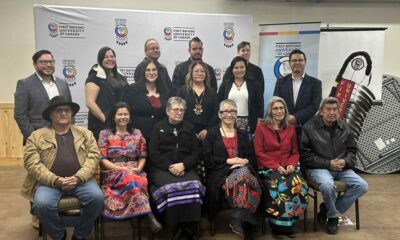Education
First Nations University Faces Internal Struggles Amid Leadership Issues

The First Nations University of Canada is currently facing significant internal challenges, primarily rooted in the longstanding issue of combining administration with political influence. This situation reflects a broader, persistent problem within Indigenous communities, where political power often remains concentrated in the hands of chiefs, hindering effective governance and educational progress.
The current structure of leadership at Indigenous educational institutions is reminiscent of practices established decades ago. In the 1970s, the Federation of Sovereign Indigenous Nations (FSIN) established three key educational organizations, intended to be governed by boards composed of chiefs. The original vision was for chiefs to set policies for the institutions while allowing day-to-day management to be handled internally. Yet, fifty years later, the same boards remain largely under the control of chiefs, which raises questions about effective governance and accountability.
To understand the present predicament, it is essential to consider the historical context surrounding Indigenous leadership. When treaties were signed, they solidified the role of chiefs and recognized their political authority. However, historical developments, including the imposition of Indian agents and church-run education, diminished the power of chiefs, reducing them to figureheads. Notable leaders like John B. Tootoosis and Walter Dieter sought to empower First Nations by facilitating the election of their own leaders, counteracting the dominance of Indian agents.
The role of chiefs has evolved, but not necessarily in a beneficial way. Today, according to Doug Cuthand, an Indigenous affairs columnist, chiefs have taken on more administrative responsibilities, often becoming inadvertently aligned with colonial practices. The government now delegates responsibilities to chiefs and councils, who are tasked with distributing limited resources and making decisions on behalf of their communities. This shift has led to a situation where chiefs may act as obstacles to progress rather than facilitators of change.
The FSIN’s recent actions raise further concerns about governance. In 2009, the federal and provincial governments mandated changes to the board of the First Nations University of Canada to ensure funding eligibility. However, in 2022, the FSIN reversed this policy, allowing chiefs to regain positions on the board without the approval of funding agencies. This decision could have significant implications for the future of Indigenous education in Canada.
Cuthand emphasizes that true democracy relies on a diverse exchange of ideas from both elected and unelected members of the community. Traditional governance structures recognized the importance of input from elders, caregivers, and even children. The current system, dominated by chiefs, risks stifling this essential dialogue.
Moving forward, it is crucial for the FSIN to reevaluate its governance structures. Replacing chiefs on educational boards with individuals who possess relevant experience and expertise could pave the way for more effective leadership. As Cuthand notes, reflecting on the past is essential for shaping a more equitable and responsive educational landscape for Indigenous peoples.
The ongoing situation at the First Nations University of Canada serves as a reminder of the complexities surrounding Indigenous governance. Addressing these internal challenges is vital for fostering a more effective and inclusive educational system that truly reflects the needs and aspirations of Indigenous communities.
-

 Politics4 weeks ago
Politics4 weeks agoSecwepemc First Nation Seeks Aboriginal Title Over Kamloops Area
-

 World5 months ago
World5 months agoScientists Unearth Ancient Antarctic Ice to Unlock Climate Secrets
-

 Entertainment5 months ago
Entertainment5 months agoTrump and McCormick to Announce $70 Billion Energy Investments
-

 Science5 months ago
Science5 months agoFour Astronauts Return to Earth After International Space Station Mission
-

 Lifestyle5 months ago
Lifestyle5 months agoTransLink Launches Food Truck Program to Boost Revenue in Vancouver
-

 Technology3 months ago
Technology3 months agoApple Notes Enhances Functionality with Markdown Support in macOS 26
-

 Lifestyle3 months ago
Lifestyle3 months agoManitoba’s Burger Champion Shines Again Amid Dining Innovations
-

 Top Stories2 months ago
Top Stories2 months agoUrgent Update: Fatal Crash on Highway 99 Claims Life of Pitt Meadows Man
-

 Politics4 months ago
Politics4 months agoUkrainian Tennis Star Elina Svitolina Faces Death Threats Online
-

 Sports5 months ago
Sports5 months agoSearch Underway for Missing Hunter Amid Hokkaido Bear Emergency
-

 Politics5 months ago
Politics5 months agoCarney Engages First Nations Leaders at Development Law Summit
-

 Technology5 months ago
Technology5 months agoFrosthaven Launches Early Access on July 31, 2025





















